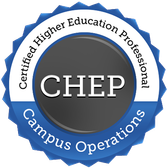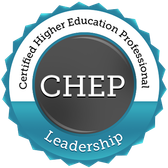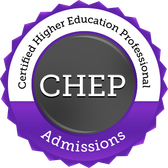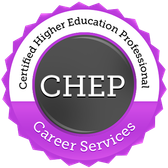Badge Evidence | Completed Courses (4 Hours Each)
ABHES101Developing a Program Effectiveness Plan (PEP)
The health care field is growing rapidly, as are the requirements for preparing individuals to enter and be successful in their chosen health care fields. To remain current with the demands of career preparation areas, colleges and universities need to have a plan of action to assess the status of programs and strategies for improving instructional offerings. This course will provide participants with a step-by-step process to complete an internal program quality assessment tool called the Program Effectiveness Plan (PEP). Resources are provided that will expand the knowledge base of participants and assist them in completing a PEP.
This course is sponsored by
Accrediting Bureau of Health Education Schools
Accrediting Bureau of Health Education Schools
ACCSC101Fulfilling the Standards of Accreditation: Administration
This course "pulls back the curtain" for schools to help them better understand the principles and purposes of the ACCSC Standards of Accreditation. ACCSC101, along with the accompanying course ACCSC102, lays out the standards in line with the way schools are typically structured to better help you comprehend the important relationship between each standard and each aspect of running a compliant, accredited school. This course addresses the standards on the administrative side of your school, such as standards that relate to operations, admissions, and financial aid.
ACCSC102Fulfilling the Standards of Accreditation: Academics
This course focuses on the ACCSC Standards of Accreditation which directly tie to the academic areas and program requirements for an accredited school. The course includes information on program development and design, educational policies and procedures, faculty, student services, and educational delivery methods.
ACCSC110Preparing for ACCSC's Essential Workforce Skills Programmatic Certification
Since the inception of career education, it seems employers have consistently claimed that students lack so-called soft skills. Although there's no universal agreement on what to call them, the term represents a set of skills (including things such as teamwork and communication skills) regarded as essential for long-term success in the workforce. ACCSC refers to these types of skills as essential workforce skills.
This course will help institutions adopt a framework for high-quality career education programs, holistically integrate essential workforce skills into their programs, enhance students' development and demonstration of them, and prepare to achieve Essential Workforce Skills (EWS) Programmatic Certification.
AD105Communication Essentials
Effective communication skills are essential in every aspect of life - especially in our work with students. This course provides a foundational understanding of all forms of communication and offers new techniques to improve admissions performance. In addition, a communication hierarchy provides participants with an advanced understanding of rapport building and connecting with today's students.
AD106RPowerful Telephone Techniques
Whether your admissions personnel work exclusively by telephone or use the phone for setting a face-to-face appointment, they need a tool kit of powerful telephone techniques to be successful in working with students. This course provides best practices for both inbound and outbound calls. Admissions professionals learn how to project professionalism and a positive attitude in their telephone personality and identify methods for conducting effective and appropriate calls.
AD107RConnecting with Today's Students and Each Other
Success in helping students begins with "connecting" in a meaningful way. These connections are formed through our ability to understand generational experiences and preferences in communication. Additionally, a better understanding of ourselves helps us connect with students. This course explores how to work better together by using common collaborative principles and improving teamwork.
AD108RBest Practices in an Ethical Enrollment Process
Ethical behavior in recruitment is essential to student and institutional success and is a crucial component of a compliant institution. This course provides a framework to evaluate your current admissions interview process and offers new tools that allow for meaningful connections with today's students. An ethical enrollment process will help your students make their own best decisions and will increase the effectiveness of your admissions personnel.
AD113Managing Your Attitude and Energy to Maximize Your Effectiveness
The most successful admissions professionals are those who maintain a positive attitude and energy, but maintaining that positivity each and every day can be tough. This course focuses on the importance of understanding and building your personal attitude and energy to maximize your effectiveness. You will have the opportunity to assess your attitude and energy and manage these elements to maximize your performance. In this course, we will examine the fundamentals of attitude and energy and understand why they are so important to your success. In addition, we will utilize assessments to look at your current attitude and energy levels. Finally, we will review tips and best practices to enhance your energy and attitude output. Once you have completed the course and activities, you will be prepared and ready to best serve your students and school by maximizing your personal attitude and energy.
AD114Adapting Your Communication for Successful Connections
Today's admissions professionals need expanded methods to adapt to where the prospective student is in the decision-making process. Whether you work with students online, face-to-face, or a little of both, adding variety will help you successfully connect with your students. In this course, you will discover ways to improve your connections with prospective students, best practices for inbound and outbound communication, how to address challenges in the moment, and methods for effective follow-up that improve your effectiveness as an admissions professional.
AD115Effective Questioning and Listening
Questioning and listening are essential elements of communication - especially when working with students. This course provides an in-depth understanding of the purpose of skillful listening, and how this is necessary to be the most effective in your position. In addition, this course provides an in-depth understanding of the purpose and types of meaningful questions. You'll be introduced to the fundamentals of both questioning and listening, as well as new tools and techniques to help you refine your questioning and listening skills.
CM101RInternal Audits: Building a Compliant Campus
This course provides an overview of the methodology and guidelines to help you outline an audit plan for your institution. You will learn how to define audit scope and determine the audit approach which fits your organization. The course provides tips for successful audits and reviews audit areas for each functional department of a typical campus, including admissions, financial aid, student accounts, education/academics, and career services. Other business areas including marketing and advertising, human resources, information security and other key areas are also reviewed to provide you with a full scope audit outline. The course concludes with information on reports, audit documentation, and follow-up recommendations following the field audit activities.
CM140Title IX and VAWA Training: Building Safer Campuses
This course is designed to assist personnel at all levels of an educational institution in the understanding of the provisions of Title IX of the Education Amendments of 1972 ("Title IX") as amended on August 1, 2024, and the Clery Act as amended in the Violence Against Women Reauthorization Act of 2013 ("VAWA"). These laws require that all individuals in an educational institution understand and comply with the laws in terms of what is prohibited behavior in relation to sex-based harassment and/or sexual violence, and what steps are to be followed when such prohibited conduct occurs. This course gives the participants information about the laws, as well as procedures to follow, to provide for the rights of all individuals under the laws. It also provides additional resources to assist educational institutions in continuing to build and strengthen their Title IX and VAWA policies, procedures and training throughout the year.
CS101Setting Up an Effective Career Services Department
This course offers strategies to provide employment and job search skills training that enables students to seek jobs in the field for which they are trained. You'll learn how to offer comprehensive career services regardless of whether your career services department is staffed full- or part-time. The course provides strategies for an institution to set up a Career Services Department, enhance and run it, and measure results. It describes how a successful career services department can ensure that your students have the skills and self-confidence to succeed in the workplace. You'll learn techniques to increase placement rates and reach out to the community to meet and maintain relationships with hiring decision-makers.
CS102Empowering Students to Find and Secure the Right Job
In this course, you will be given tools to help your students find the job that's right for them, present themselves impressively on paper, and interview with ease. This course is designed so you can successfully support your students in four phases of their job search: doing a targeted job search, writing a powerful resume and cover letter, presenting professionally, and developing effective interview skills.
CS104Developing a Social Media Strategy for Career Services
Social media is critical tool for career services professionals to interact with and reach their constituent groups yet many career professionals aren't aware of how to develop a purposeful social media strategy. Without a social media strategy, career services departments risk losing relevance with their audience, and they also lose the opportunity of harnessing social media to achieve department goals. This course describes the phases of planning and implementing a social media strategy for your career services department. Each module is based on the fundamental steps of preparing a comprehensive and measurable plan to achieve the goals of the career services department.
CS105Setting Up an Effective Alumni Association
Educational institutions have opportunities to create unique alumni associations which will look and feel more like alumni communities. This course will show you how you can create active alumni communities to increase enrollment, retention and placement for your entire institution. You will learn how to provide your alumni with valuable services and how to seek their help to enhance your educational programs and career services, as well as marketing and admissions. From getting started to setting up an alumni data base management system and determining the institution's return on investment, this course provides you with operational strategies for establishing an effective alumni association.
CS106Becoming an Effective Job Developer
Although job developing requires a mix of critical skills, many career advisors are forced to learn them through the "sink or swim" method. They're often asked to immediately make a specific number of cold-calls daily. They learn that "job developing" is synonymous with cold-calling. It isn't. This course covers how to properly prepare for job developing, how to prospect, prioritize employer contact, and communicate with employers to address objections, get job orders, manage them to completion, and continuously engage employers and candidates to develop long-term partnerships. Job developing should be more comprehensive than a simple list of employers to cold-call.
CS107Advising Students on Using Digital Career-Marketing Strategies
In today's world where jobs are posted online, matching algorithms screen digital résumés, and recruiters source candidates online, students must market themselves online. Writing a résumé and cover letter alone is no longer an adequate skill set for career seekers to successfully find and secure employment as well as manage, advance, and transition their career throughout life. Students must know how to digitally market themselves, and 21st century career advisors must know how to advise them. This course will help you advise students on developing digital career-marketing strategies for career success.
CS109REmpowering Justice-Involved Learners for Career Success
Working with justice-involved learners can feel like navigating a maze of legal constraints, stigma, and high-stakes hiring processes. This course equips you with innovative, real-world strategies to unlock fresh employment opportunities for these individuals, while elevating your own professional impact.
Discover powerful tactics for instilling confidence, guiding disclosure conversations, and crafting “turnaround talks” that reframe negative narratives. You’ll gain an insider’s view into how employers assess risk, why fair chance hiring matters, and how to overcome common obstacles to employment. By the end, you’ll be fully prepared to coach learners to confidently navigate the employment landscape. Strengthen your toolkit and become a catalyst for meaningful opportunities – enroll today!
FA110Developing an Efficient Financial Aid Office
This course provides a blueprint for running an effective financial aid office in an educational institution. You will learn to optimize the performance of your financial aid office with a minimum of waste, expense, and unnecessary effort. The course covers the cornerstones of an efficient financial aid office: timeliness, accuracy and customer service. You will also be advised of pitfalls to avoid in the realm of Title IV compliance. You will learn the key points to building an effective business office processing procedure. Reports and notifications required by the Department of Education are also explained. In addition, you will be given pointers on preparation for the annual Student Financial Aid (SFA) compliance audit and alerted to the most common triggers for Department of Education Program Reviews.
FA120Default Prevention: A State of Mind
This course offers proven-successful techniques that ultimately prevent student loan delinquencies and defaults. Because there is not one miracle that reduces the chance of student loan defaults, this compilation of ideas and practices collectively greatly reduces those risks by giving ownership of the loan responsibilities to the students who benefit from them. By integrating effective borrower education and interaction from the day your students walk through your front door, your students will embrace the state of mind needed to give them lifetime accountability for their Federal Student Loans obligations.
FA210Application Process: Verification, C-Codes and PJ
This course is designed for the financial aid representative who is familiar with the financial aid process, and the campus manager seeking to learn more. The course provides a detailed review of the FAFSA to ISIR/SAR application process, concentrating especially on the technical aspects of the process beyond timeliness and accuracy. The importance of documenting verification and clearing comment codes will be explored, in addition to your role in using professional judgment.
FA230Financial Aid Management - Compliance without Compromise
With a seemingly endless stream of new laws and regulations, institutions have become burdened with ensuring they are compliant, while continuing to give great customer service to their students and families and all while achieving larger institutional goals. The role of the Financial Aid Office in compliance cannot be underestimated, but the Director of Financial Aid cannot ensure compliance in a vacuum.
This course is designed to examine the fundamentals of law and regulation, and of the enforcement process. More importantly, this course provides tools for School Directors, Chief Financial Officers, Enrollment Managers, and Financial Aid staff to develop and build compliant practices that don't interfere with effective operations, customer service or institutional goals.
FA231Regulatory Compliance - Outside the Financial Aid Office
This course will help participants to interpret the many rules and regulations that are required by educational institutions offering Title IV funding. It will aid in preparing management and faculty in recognizing that compliance is the responsibility of the entire institution and is not just the job of the Financial Aid Office. Course content will also aid the individual in building a "culture of compliance" which will encourage teamwork and secure the cooperation of others on campus.
LS101RDo You Manage Or Lead?
This course explores the critical differences between management and leadership. Participants will be introduced to definitions and myths about each area as well as how management and leadership must coexist for an organization to operate effectively. Participants will explore their own management/leadership tendencies through exercises to see leadership and management in action.
LS102How Do You Lead?
Not everyone is suited for, or desires, a leadership position. One of the first steps to being an effective leader is to understand the desire to lead in the first place. Participants will explore their motivation to lead and develop a deeper understanding of their leader style(s).
LS103RYour Leadership Impact
To improve your impact and effectiveness as a leader, you must not only understand the role of a leader, but you must also take into consideration the followers and the situation. This course defines leadership impact and explores the interactional framework for leadership.
LS104RYour Leadership Legacy
The higher education industry provides a wealth of opportunities and challenges for those seeking leadership positions. In this course, participants will gain a deeper understanding of the higher education sector and themselves. The importance of higher education institutions will be explored along with developing a personal leadership legacy.
LS105RYour Leadership Toolkit
Get ready to add a number of skills to your toolkit as you develop as a leader! This course focuses on increased self-awareness in communication styles and learning; developing deeper understanding through empathic listening; and motivating through innovation.
LS106This Way to Leadership
This course provides you with a framework to put your self-discovery and learning into a workable plan to further develop your leadership skills. A step-by-step process is offered to help you create a meaningful Personal Leadership Development Plan (PLDP) complete with the development of SMART Goals and advice from some of today's leaders in the higher education sector.
OP105Developing a Five-year Plan for Your Educational Institution
What will your institution look like in five years? Growth takes change and the commitment of the stakeholders in your organization. A five-year plan is essential for any owner or director of an educational institution, no matter how long they have been in the business. It includes various elements such as your enrollment goals for all programs, plans for new programs, new profit center potential, fees and all financial aid opportunities, enhancement of student services, faculty and staff planning, marketing and development strategies, and planning for physical space to support your expansion goals. Also, development plans are often needed to satisfy licensing and accreditation requirements.
This course covers the essential components and techniques involved in developing a comprehensive five-year plan. We will show you an effective step-by-step planning process that involves the participation of representatives from your institution including staff, instructors, students, graduates, and the employers who hire your graduates. The process encourages participants to share their knowledge and ideas, and everyone who participates in the process ultimately becomes a stakeholder in making the plan work. The course includes planning worksheets that you can download and use to help you develop your institution’s five-year plan.
OP106Developing New Programs: Research and Selection
Educational institutions need to be aware of emerging employment opportunities in new and expanding fields if they are going to continue to attract students. Most licensing and accrediting agencies ask an institution for some form of feasibility study when submitting new program-add applications. The research involved in this step often requires proof of need for the program, number of anticipated job openings, and input from employers. This course outlines ways to collect data to make an effective decision and show regulatory agencies proof of employment opportunities. Step-by-step directions are included to assist institution staff in conducting effective research and preparation of curriculum to meet employer specifications.
OP110Developing Effective Advisory and Governing Boards
Vital advisory and governing boards create additional opportunities to enhance operations within an educational institution. Well-prepared board members engaged in appropriate and timely activities can make a substantial contribution to operational, financial and management success. Creating, managing and maintaining effective advisory and governing boards can be a demanding yet rewarding process. Board members have to be identified, recruited, and trained to be effective and to understand their role as individual contributors and as members of a group of advisors. To gain maximum leverage from a board, members must also remain motivated and retain a concentrated focus on the institution's mission, purpose and goals. This course will provide a blueprint, with accompanying checklists, for establishing and maintaining effective advisory and governing boards in an educational institution.
OP115RHiring the Right Faculty for Your Institution
This course shows you how to hire high-quality instructors and orient them to your institution. The skills also apply to hiring staff. It's easy to hire someone to do a job. But it can be difficult to hire the right person. You want instructors who are top notch. They represent your institution and interact with the most people at your campus and particularly your students. This course starts with how to determine exactly what type of people you need as your instructors. Then it shows you how to recruit and hire them. Once hired, you'll learn how to introduce them to the working environment at your institution. By the time you finish this course, you'll be recruiting, hiring, and orienting quality instructors. You'll see results in improved enrollments, student achievement, retention, and completion.
OP121Managing Online Faculty at a Distance
It is no longer news that predictive learning analytics are changing online classroom instruction. This course teaches current trends in locating, hiring, monitoring and retaining the best professionals that specialize in online instruction. More importantly, this course provides insights for using the new predictive analytic approaches to optimize management of online faculty. Generalized "best practices" are waning in favor of real-time monitoring for individualized qualitative and quantitative analyses. This real-time approach provides significantly increased student success and retention. Also addressed in the course is how to build a strong faculty management team, continuing faculty development recommendations and various business considerations.



















































